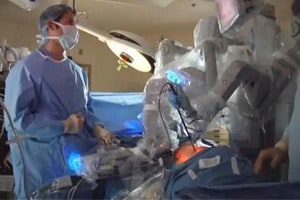
Researchers at Johns Hopkins are warning that inappropriate reporting processes may be hiding real dangers tied to robotic surgical procedures, such as those conducted using Intuitive Surgical’s da Vinci system. Most reported injuries and deaths involved gynecologic surgery. The researchers reviewed U.S. Food and Drug Administration (FDA) databases, cross-referencing court records and news reports with […]
 Researchers at Johns Hopkins are warning that inappropriate reporting processes may be hiding real dangers tied to robotic surgical procedures, such as those conducted using Intuitive Surgical’s da Vinci system. Most reported injuries and deaths involved gynecologic surgery.
Researchers at Johns Hopkins are warning that inappropriate reporting processes may be hiding real dangers tied to robotic surgical procedures, such as those conducted using Intuitive Surgical’s da Vinci system. Most reported injuries and deaths involved gynecologic surgery.
The researchers reviewed U.S. Food and Drug Administration (FDA) databases, cross-referencing court records and news reports with the agency’s adverse events reports. The team discovered 8 adverse events that “were not appropriately reported to the FDA,” according to MassDevice.com. Five cases were never filed and two were filed after media outlets became aware of the matters. It is possible that more cases have occurred and not been reported, the researchers said.
Of the reports, it was gynecological procedures conducted via robot-assisted surgery that were connected with the highest death rates, according to MassDevice.com, which noted that of 71 reported deaths, 22 involved robot-assisted gynecologic procedures. Hysterectomies were associated with the highest reported complication rates—43 percent of injuries—and typically involved excessive bleeding.
The Johns Hopkins report was just published in the Journal for Healthcare Quality and discusses a so-called “slapdash” system of reporting complications associated with the robotic devices, according to MassDevice.com.
“The number reported is very low for any complex technology used over a million times,” Johns Hopkins associate professor Dr. Martin Makary said. “Doctors and patients can’t properly evaluate safety when we have a haphazard system of collecting data that is not independent and not transparent. There may be some complications specific to the use of this device, but we can only learn about them if we accurately track outcomes,” Dr. Makary added, according to MassDevice.com.
Some 1 million robotically assisted surgeries have taken place since 2000; however, U.S. Food and Drug Administration (FDA) data only indicates that 245 complication reports have been made, including reports of 72 deaths, MassDevice.com reported. The researchers say that the number is simply too low for the amount of complex surgeries that have been completed and that current reporting standards may be, in part, to blame.
“We need to be able to give patients answers to their questions about safety and how much risk is associated with the robot. We have all suspected the answer has not been zero,” Dr. Makary said. “We still don’t really know what the true answer is,” he said, MassDevice.com reported.
Dr. Makary pointed out, according to MassDevice.com that, “We need innovation in medicine and, in this country, we are tremendously good at introducing new technologies…. But we have to evaluate new technology properly so we don’t over-adopt, or under-adopt, important advances that could benefit patients.”
Robotic surgery has been the focus of not just injury reports, but mounting litigation, as well. The systems recently caught the attention of federal regulators. An FDA warning letter cited “objectionable observations” about Intuitive Surgical’s complaint handling and recall procedures regarding its da Vinci system, according to MassDevice.com.


